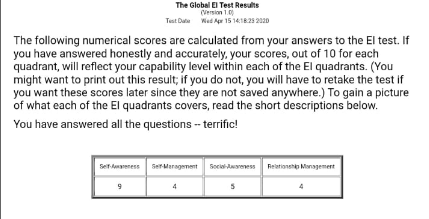Discussing Results Using Johari Window Technique
Question
Task:
Write a reflective essay after:
1. You have taken the two tests
2. Your two friends complete the two tests to evaluate you
3. Use the Johari Window to discuss the results
4. Show the results of your tests to your lecturer (if you are an online student email them to your
lecturer)
Answer
Introduction
The current paper uses Johari Window technique in order to discuss the results obtained from Psychometric test. Psychometric test is a standard and scientific way used for the measurement of individuals’ psyche capabilities and behavioural styles (Serrat 2017). Multiple intelligence tests help to learn intelligence of the individuals and people can have the personalised test results online. This essay is a reflective account of the two tests, GEIT and Daniel Goleman’s EQ. I personally conducted these two tests online and two of my friends conducted these two tests also keeping me on their minds. I finally compare their test results to mind and I tried to find and discuss the results using Johari Window technique.
Part 1
I conducted two tests personally, first one was Emotional Intelligence Test on Mindtool.com and the second one was GEIT. Two of my friends also conducted these tests and I asked to provide my scores according to my nature and skills. In Emotional Intelligence, I scored 59 when I conducted this test, whereas Binal got the score 66 for me and Gaurav got the score of 51 for me.
In case of GEIT test, I scored 8 in self-awareness, whereas Gaurav got 5 for me and Binal got 9 for me in self-awareness. As stated by Gilbert et al. (2017), self-awareness is the core of emotional intelligence and self-awareness is the comprised major three competencies, emotional self-awareness, actual seld-awareness and self-confidence. In self-management, I scored myself only, whereas, Gaurav got the score of 2 for me and Binal provided a score of 4 for me. In social awareness, I scored 7 out of 10, Gaurav gave me a score of 4 and Binal got the score of 5 for me. Social awareness has three major qualities within it, empathy, organisational awareness and service orientation (Berkenkotter and Huckin 2016). I got a good score regarding this and I also think, I am socially aware and outspoken in nature. In relationship management, I scored 5, Gaurav gave me 4 and Binal got the score of 4 for me.
Johari Window technique has four quadrants and this quadrant is part of ourselves which we and others can see (Hillson and Murray-Webster 2017). Arena quadrant of Johari Window technique has the qualities which can see both the subject and others. In the case of mine, Relationship management is the quality which can see by me and my peers and friends also think the same for me. Relationship management skill has the qualities of adaptable, observant, self-conscious and trustworthy. These qualities of mine, I can understand and my friends can perceive. Blind quadrant of Johari Window technique is not selected by the subject; however, friends and peers can understand these qualities. Social Awareness is part of emotional intelligence, which is my Blind quadrant. Introverted, independent, cheerful, reflective and responsive are some of the skills related to social awareness. These skills represent which skills others may think I have, however, I do not think that I have these skills within me. Hidden quadrant skills of Johari Window technique are selected by the subject; however, peers do not think that the subject has these skills (Hillson and Murray-Webster 2017). Self-awareness skills are associated with confidence, idealistic, bold, ingenious and loving and knowledgeable. I was quite awful to know that my friends do not think that I have self-awareness skill as since the childhood I have been showing the skill of self-awareness; however, these skills are kept hidden. Finally, Unknown quadrant of Johari Window technique shows the skill which neither I nor my friends think that I have, this skill is social management. These skills represent my motives and behaviour which no one recognises within me.
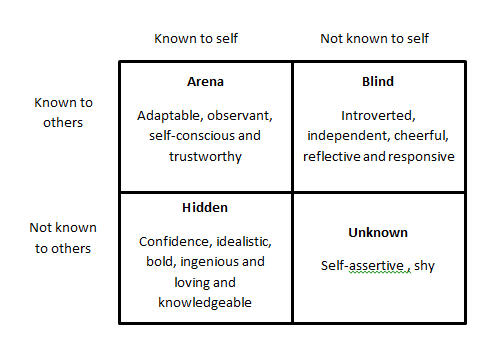
Figure: Johari Window technique
(Source: Self-developed)
Part 2
Johari Window technique assists an individual to better understand the relationship with others and it is primarily used for self-help and corporate setting (Berland 2017). According to the tests and feedback from the others, I think my strengths lie on the self-awareness skill and relationship management skills. My strengths are self-awareness as this is the thinking skill which focuses on the ability to accurately judge someone and own. Self-awareness also helps me to tune into my own feelings and the behaviours of the others. My strengths are that I am confident, idealistic and bold in my decisions. These confidence and bold decisions in every sphere of my life will help to get my desired future career.
On the other side, my weaknesses lie on the fact that I am not socially aware and I am poor in self-management. I cannot control my feelings sometimes and I am not empathetic to all always. I need to develop my emotions to others needs, concerns and emotional capabilities. I lack in organisational awareness as these skills are associated with politics within the companies and how these may affect others. Therefore, I lack in self-management and self-management skills. Relationship management has qualities within it like, visionary leadership, influence, convincing nature and listening skills (Goetsch and Davis 2016).
In order to improve my emotional intelligence, I need to develop my empathy towards others and I will utilise an assertive style of communication with other people. In addition, I am planning to respond to others' appeal instead of reacting to conflict along with I will also utilise active listening skills so that others may feel valued. It is very important for me to practice and maintain a positive attitude towards others and in future, I will take critique well.
Part 3
I would like to develop my competency regarding showing respect to different communities and culture. Respect is very important in which I would like to work in future and I will try to listen to and showing kindness to different individuals within the organisation. Since childhood, I have shown affirm in giving evidence to others and I will also be polite to others in my future organisation.
In addition, I would like to show my flexibility nature in my future organisation in order to function well in a global context. Orthodoxy is not appropriate when it comes to working in a culturally diverse organisation (Van Deursen et al. 2015). Flexibility in the workplace allows making an arrangement about conditions of working as I can work with any religion, caste and creed people. I have always been nurtured my adaptability skill and I can work in any part of the world showing my adaptability and relationship management skill.
I want to develop effective and appropriate communication skill so that I can communicate with anyone in a culturally diverse context. In the future workplace, I may be possible to work with individuals who may come from different culture or language. I will simplify the message when communicating and I will be practising the skill of developing body language. Maintaining eye contact and taking time to respond is very important for communication. For example, Accenture Australia provides the employees training to work in a culturally diverse workplace and their cultural awareness creates maximum value among employees showing respect to different employees.
Additionally, considering the discussion on Johari Window technique, I need to develop Team-working skill so that, it can be possible for me to collaborate with others who are culturally diverse at the workplace and thereby, meeting the goal of particular tasks. Moreover, it will be possible for me to practice the skill of negotiation and thereby, improving rapport-building and active listening abilities as well (Azizan et al. 2018).
Moreover, I want to improve the skill of empathy so that, I will be able to understand the others’ perspective. This is one of the required abilities in the culturally diverse workplace as without being able to judge things in the frame of others it will be difficult to work collaboratively with people who are culturally diverse. Here, with the help of empathy skill, I will be able to understand what leads people to act differently and this will help me to develop my future career prospects.
Conclusions
To conclude, it was very amazing to use the Johari Window technique as I tried to critically analyse the findings and based on the test results and feedback of others. I personally made able to find out my strengths and weaknesses which will help me in developing my future career skills. I need to develop my skill of emotional intelligence as I lack social awareness and self-management. It is needed to develop empathy for the others and showing respect and understanding the effective communication may help in working for culturally diverse organisations in future.
Reference List
Azizan, M.T., Mellon, N., Ramli, R.M. and Yusup, S., 2018. Improving teamwork skills and enhancing deep learning via development of board game using cooperative learning method in Reaction Engineering course. Education for Chemical Engineers, 22, pp.1-13.
Berkenkotter, C., and Huckin, T. N. 2016. Genre knowledge in disciplinary communication: Cognition/culture/power. Johari Window technique Abingdon: Routledge.
Berland, A. 2017. Using the Johari Window to explore patient and provider perspectives. International Journal of Health Governance, 22(1), pp.47-51.
Gilbert, D., McKee, A., Spreitzer, G., and Amabile, T. 2017. Happiness (HBR Emotional Intelligence Series). Harvard Business Press.
Goetsch, D. L., and Davis, S. B. 2016, Quality management for organizational excellence. Upper Saddle River, NJ: Pearson.
Hillson, D., and Murray-Webster, R. 2017. Understanding and managing risk attitude. Abingdon: Routledge.
Serrat, O., 2017. Understanding and developing emotional intelligence. In Knowledge solutions (pp. 329-339). Springer, Singapore.
Van Deursen, A. J., Bolle, C. L., Hegner, S. M., and Kommers, P. A. 2015. Modelling habitual and addictive smartphone behaviour: The role of smartphone usage types, emotional intelligence, social stress, self-regulation, age, and gender. Johari Window technique Computers in human behaviour, 45, pp.411-420.
Appendices
Appendix 1
Daniel Goleman’s EQ Test (Self-Conducted)
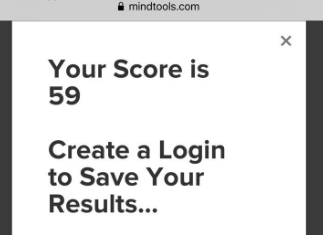
(Test Conducted Source: https://globalleadershipfoundation.com/geit/eitest.html)
Global Leadership Foundation’s Global Emotional Intelligence Test (GEIT) (Self-conducted)
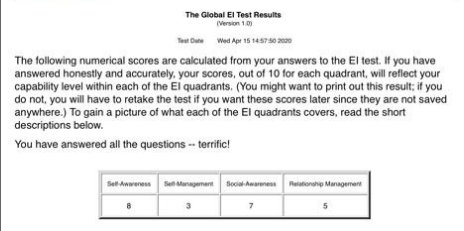
(Test Conducted Source: https://www.mindtools.com/pages/article/ei-quiz.htm)
Appendix 2
Daniel Goleman’s EQ Test (Assessed by Friend 1: Gaurav)
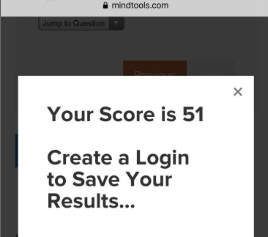
Global Leadership Foundation’s Global Emotional Intelligence Test (Assessed by Friend 1: Gaurav)
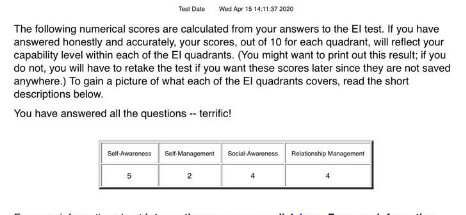
Appendix 3
Daniel Goleman’s EQ Test (Assessed by Friend 2: Binal)
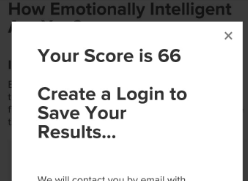
Global Leadership Foundation’s Global Emotional Intelligence Test (Assessed by Friend 2: Binal)
